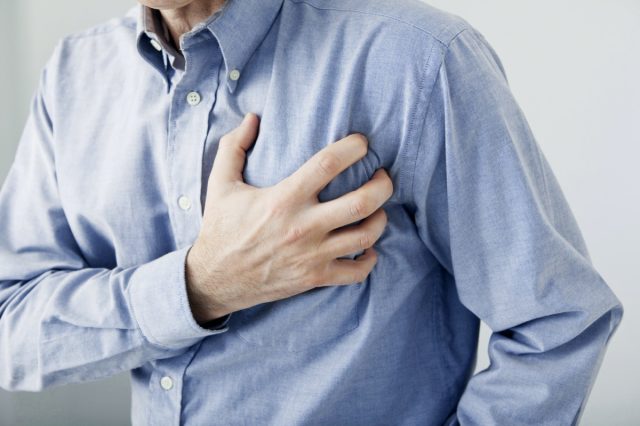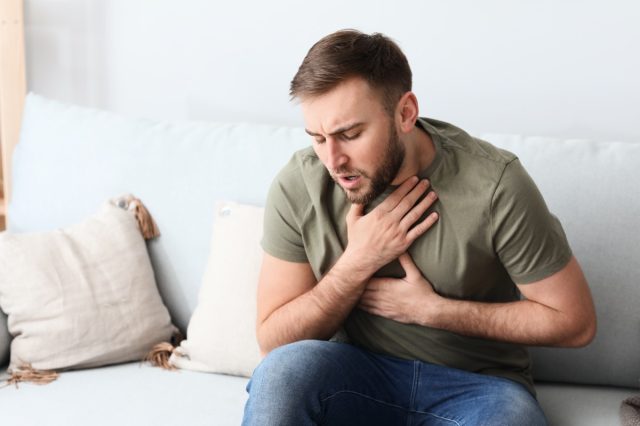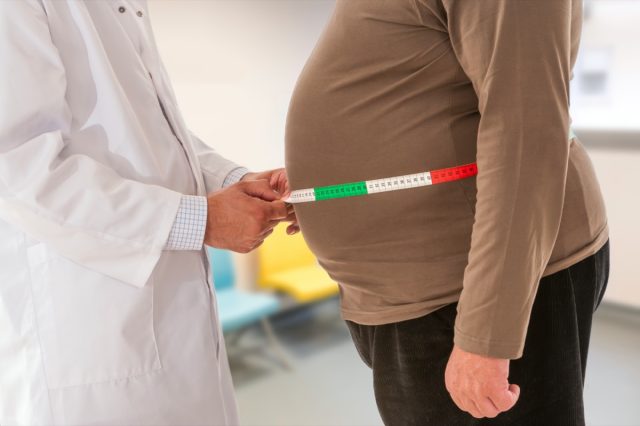Life expectancy for men in America is 75.1 years old and for women 80.5. What can prevent you from making it that far—what is the #1 cause of early death? COVID aside, "Heart disease is the leading cause of death for men, women, and people of most racial and ethnic groups in the United States," reports the CDC. "One person dies every 36 seconds in the United States from cardiovascular disease."
Coronary Heart Disease is the Most Common Type of Heart Disease

The CDC says "Coronary heart disease is the most common type of heart disease, killing 360,900 people" a year. Says the Mayo Clinic: "If your coronary arteries narrow, they can't supply enough oxygen-rich blood to your heart — especially when it's beating hard, such as during exercise. At first, the decreased blood flow may not cause any symptoms. As plaque continues to build up in your coronary arteries, however, you may develop the following coronary artery disease signs and symptoms:"
You May Have Chest Pain (Angina)

"You may feel pressure or tightness in your chest, as if someone were standing on your chest. This pain, called angina, usually occurs on the middle or left side of the chest. Angina is generally triggered by physical or emotional stress. The pain usually goes away within minutes after stopping the stressful activity. In some people, especially women, the pain may be brief or sharp and felt in the neck, arm or back," says the Mayo Clinic.
You May Have Shortness of Breath

"If your heart can't pump enough blood to meet your body's needs, you may develop shortness of breath or extreme fatigue with activity," says the Mayo Clinic.
You May Have a Heart Attack

"A completely blocked coronary artery will cause a heart attack. The classic signs and symptoms of a heart attack include crushing pressure in your chest and pain in your shoulder or arm, sometimes with shortness of breath and sweating. Women are somewhat more likely than men are to have less typical signs and symptoms of a heart attack, such as neck or jaw pain. And they may have other symptoms such as shortness of breath, fatigue and nausea.
Sometimes a heart attack occurs without any apparent signs or symptoms," says the Mayo Clinic.
These Factors Put You at Risk for Heart Disease

The CDC warns: "High blood pressure, high blood cholesterol, and smoking are key risk factors for heart disease.
Several other medical conditions and lifestyle choices can also put people at a higher risk for heart disease, including:
- Diabetes
- Overweight and obesity
- Unhealthy diet
- Physical inactivity
- Excessive alcohol use"
Says the Mayo Clinic: "If you think you're having a heart attack, immediately call 911 or your local emergency number. If you don't have access to emergency medical services, have someone drive you to the nearest hospital. Drive yourself only as a last option.
If you have risk factors for coronary artery disease — such as high blood pressure, high cholesterol, tobacco use, diabetes, obesity a strong family history of heart disease — talk to your doctor. Your doctor may want to test you for coronary artery disease, especially if you have signs or symptoms of narrowed arteries."
No comments:
Post a Comment